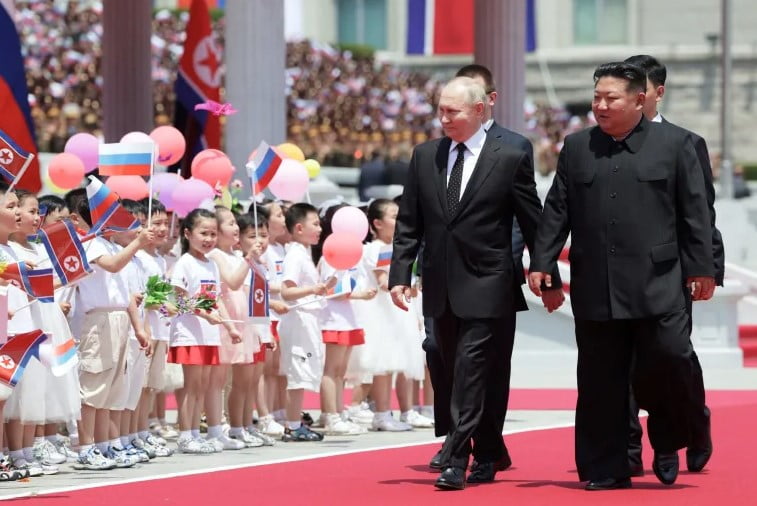In a recent, pivotal development, Russian President Vladimir Putin and North Korea’s Supreme Leader Kim Jong Un have inked a comprehensive partnership agreement that raises considerable concerns across the international stage. This mutual defense treaty, signed during Putin’s ceremonious visit to Pyongyang—his first since 2000—promises mutual assistance in the event of aggression against either nation. The repercussions of this pact are profound, hinting at a deepening geopolitical rift with potential global ramifications.
The agreement is not merely a statement of solidarity; it is a strategic alignment between two nations led by figures notorious for their contentious relations with the West. Putin’s visit, replete with North Korean pomp and spectacle, underscores a partnership that transcends mere diplomatic niceties, hinting at a significant shift towards a more militarised, confrontational posture against perceived Western hegemony.
This alliance is particularly alarming given the backgrounds and current international standings of both leaders. Russia, embattled in a protracted conflict in Ukraine, and North Korea, isolated due to its nuclear ambitions and human rights record, are increasingly seen as pariahs on the global stage. Their collaboration, therefore, is not viewed through the lens of peace-building but as a strategic maneuver to counteract Western influence and sanctions.
The details of the treaty include clauses for mutual defense, which could potentially see Russian intervention in Korean peninsula conflicts or North Korean involvement in Eastern Europe. Such scenarios would not only escalate regional tensions but could also lead to a broader global conflict, making this alliance a flashpoint in international relations.
Furthermore, the partnership between Putin and Kim extends beyond military cooperation. It is reported that North Korea may have supplied weapons to Russia for use in Ukraine, while Russia could be aiding North Korea’s space technology efforts, enhancing their ballistic missile capabilities. This cooperation indicates a deepening of military ties that contribute to global weapons proliferation concerns.
The treaty has also elicited strong reactions from neighbouring South Korea, which perceives the Russo-North Korean alliance as a direct threat to its security and regional stability. The U.S. and NATO’s recent decision to allow Ukraine to use Western weapons on Russian soil only adds layers to the already complex international puzzle, suggesting that further escalations could be on the horizon.
Observers and analysts are ringing alarm bells, noting that this alliance could signify a new era of geopolitical tension where old and new powers coalesce around conflicting visions of global order. This treaty, thus, is not just a regional concern but a global one, with implications that could redefine alliances and provoke new conflicts in an already turbulent world.
Further Reading
